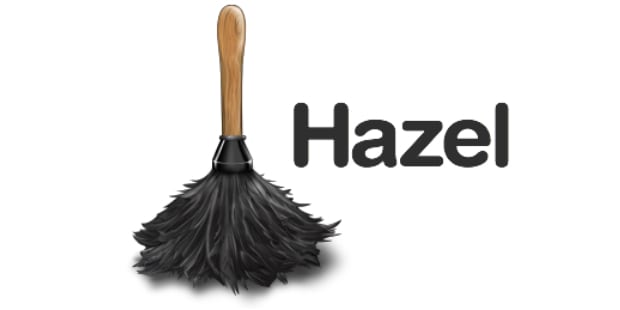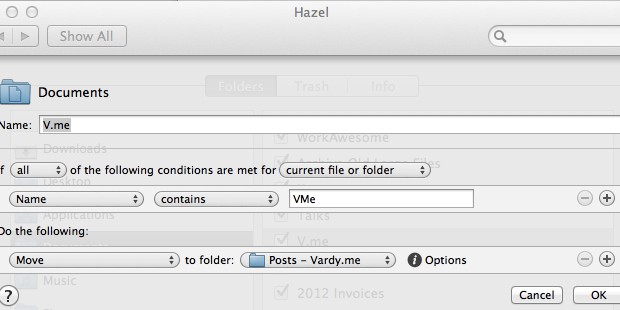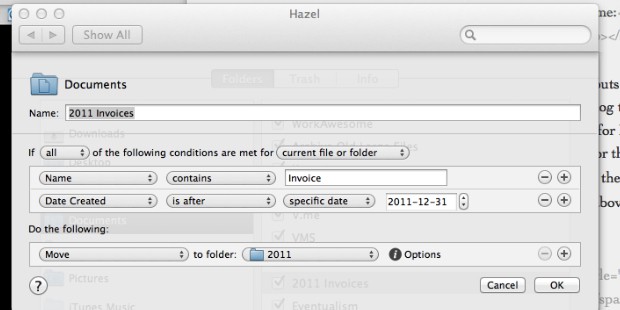
As we head into the home stretch here during “How I..” Week, I’m going to give a brief overview of how I use Hazel, a fantastic rules-based organizational tool that comes from the fine folks at Noodlesoft. They just updated Hazel to its third version last week, and it was a jam-packed upgrade to say the least.
While I haven’t had as much of a chance to dig deep into all of the shiny newness offered in Hazel 3, I am pretty impressed with the new nested conditions that it brings to the table. Again, I’m just diving into this version of the software, so I won’t be able to go into how much more they’ll add to how I have been using Hazel. What I can say is that it will allow me to get more granular, so you can take some of what I mention below and apply nested conditions (Eddie Smith over at Practically Efficient offers a way to get into them) to some of it once you’re familiar with them.
Unlike the other applications I’ve covered (Evernote and Dropbox), there’s not really much to write about in terms of how I don’t use it. I suppose the only thing I could say is that I probably don’t use it for enough things, but that’d be about it.
How I do use it? Well, that’s where the goods are.
How I Use Hazel
I use Hazel to uninstall applications. Completely.
Before I had Hazel, I used AppZapper – and it worked fine for uninstalling apps. It got rid of all of the junk left behind when you discard an app, and that’s something that is extremely valuable if you download and test a lot of apps. It really comes in handy during an ongoing decluttering as well.
But once I discovered Hazel and its ability to do the exact same thing and do everything else it does, AppZapper was quickly added to the “decluttering pile” and Hazel now handles all of that business. I simply drag an app to Trash and Hazel then asks me if I want to discard all of the bits that came along with it that would otherwise remain on my hard drive.
What that means is that I’m getting two apps for the price of one. Less is indeed more with Hazel on my side.
I use Hazel to keep things where they need to be for me.
I can’t stress enough how much time Hazel has saved me because of the ability to set up either incredibly simple or complex rules. That said, it does take front end work – more than with any other app I’ve come across – to make that kind of efficiency happen over the long haul.
Here are just some of the things that my Hazel rules do for me:1
- Takes any document that I write for my weblogs and puts them in the appropriate folders, even if I just save them in my Documents folder. It also organizes them by weblog type, year and month based on the prefix I give it in the file name (LH for Lifehack, VM for this weblog, EVM for Eventualism, etc.), and then Hazel looks at the date the file was created and puts them in a pre-existing folder for the year and month or if there is no folder for the year and/or month it creates the folder(s) and then puts the file in it.
- Moves my invoices and receipts in a similar fashion as above, allowing me to easily deal with my income and expenses throughout the year.
- Puts images into iPhoto for me as I save them.
- Imports all of my saved PDFs into Evernote.2
Luckily, there are resources out there that allow you to set up Hazel a lot faster than if you were to give it a go on your own. One of the best is the Noodlesoft Recipe Exchange, where you can find a ton of useful Hazel rules already tried, tested and true.
I use Hazel to automatically share.
You’ll notice above that I mention how I have my invoices and receipts moved by Hazel to where I need them to be. Well, these days I need them to be accessible by my wife, who is handling all of the finances around here. By making a modest change to the rule I had set up, I managed to get the file into a shared Dropbox folder so that my wife can access the files as she needs them.
I’ve set up similar rules for sharing things with the shared folders for Lifehack, Dyscultured and Mikes on Mics. By using prefixes in the file name (yet again) I am able to seamlessly get the files into Dropbox, and that speeds up things considerably on both sides of the equation.
Some Final Thoughts
Hazel is a must-have app if you’re ready to level up your productivity on the Mac. Like some of the higher-end productivity apps (such as OmniFocus), Hazel can be as powerful as you want it to be but as simple as you need it to be. While it may not be easy to wrap your head around, there are plenty of folks out there who can help make that happen for you.
You can count me as one of them.
1Hat tip to David Sparks as he inspired me to not only dive in deeper to Hazel but also get incredibly granular with it. This episode of MPU is one you must listen to if you want to really get the most out of Hazel.
2Hat tip to Mac|Life for setting me straight with this rule .



